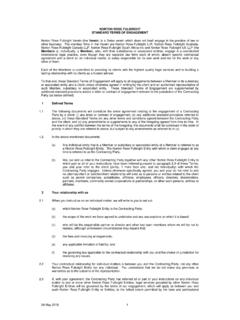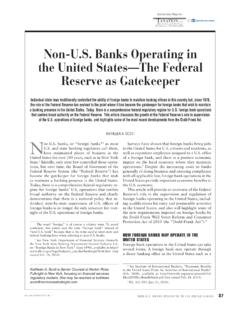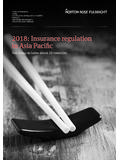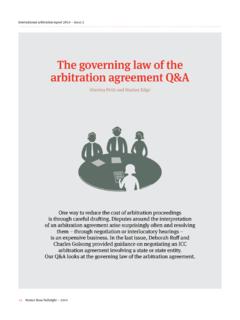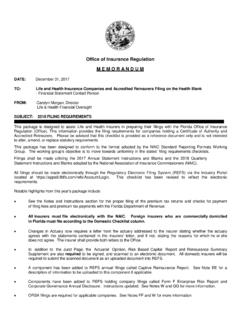Transcription of Norton Rose Fulbright - Bid Template (A4 ls)
1 GDPR checklist Contents Introduction 1 Territorial scope 2 Supervisory authority 3 Data governance and accountability 4 Export of personal data 12 Joint controllers 14 Processors 15 Lawful grounds to process and consent 16 Fair processing information / notices 18 Data subject rights 19 Big Data, research and wholly automated decision making 20 Personal data breach 21 The team 23 Norton Rose Fulbright LLP March 2018 1 Introduction The EU General Data Protection Regulation (GDPR)1 will apply directly in all EU Member States from 25 May 2018. It will repeal and replace Directive 95/46EC and its Member State implementing legislation. Together with the Directive on the Processing of Personal Data for the Purpose of Crime Prevention,2 the GDPR presents the most ambitious and comprehensive changes to data protection rules around the world in the last 20 years. The GDPR rules apply to almost all private sector processing by organisations in the EU or by organisations outside the EU which target EU residents.
2 The export regime will ensure their impact is felt where such organisations transfer personal data to the EU. The maximum fines for non-compliance are the higher of 20m and 4% of the organisation s worldwide turnover. The concept of accountability is at the heart of the GDPR rules: it means that organisations need to be able to demonstrate that they have analysed the GDPR s requirements in relation to their processing of personal data and that they have implemented a system or programme that allows them to achieve compliance. This table is designed to give an illustrative overview of the requirements likely to impact most types of businesses and the practical steps that organisations need to take to meet those requirements. It can be used to gain an understanding of where an organisation has gaps in its compliance and to articulate how its control programme meets the requirements. It should be noted that certain parts of the GDPR (such as exceptions to the data subject rights) will be supplemented by Member State local legislation and guidance from local data protection authorities, which will be renamed Supervisory Authorities, and the Article 29 Working Party, which becomes the European Data Protection Board under the GDPR.
3 If your organisation needs assistance with analysing and implementing changes arising from the application of the GDPR please contact one of the Norton Rose Fulbright European data protection team members whose details are set out at the back of the checklist. 1 Publication of the English text in the Official Journal can be found here :L:2016:119:TOC 2 This was approved on the same date and the final English text can also be found at :L:2016:119:TOC Norton Rose Fulbright LLP March 2018 2 Territorial scope The scope of the GDPR is extended so that many companies based outside the EU that are processing personal data about persons who are in the EU need to comply and appoint a representative in the EU. Arts 3, 27 Rec 22-25 Controllers outside the EEA The GDPR applies to controllers and processors established in the EU. It also applies to non-EU establishments where data about data subjects who are in the EU is processed in connection with offering goods or services or monitoring their behaviour.
4 Organisations should: identify non-EU group companies that monitor, track or target EU data subjects. Art 27 Rec 80 Appointing a representative for non-EU entities Where the controller or processor is not established in the EU but is caught within the scope of the GDPR, the controller or processor must designate a representative in a Member State in which the data subjects are whose personal data is processed in relation to the offering of goods or services, or whose behaviour is monitored, unless an exception applies ( where the processing is occasional or where the organisation is a public body). Organisations should: consider whether such non-EU group companies need to have an EU representative or whether an exemption applies; ensure that where such non-EU group companies are required to have an EU representative, that the representative is appointed in an appropriate EU country, that such appointment is in writing and that the company has complied with GDPR rules in respect of that processing (including in respect of required documentation as described below).
5 Norton Rose Fulbright LLP March 2018 3 Supervisory authority The GDPR requires national data protection authorities (Supervisory Authorities) to respond to complaints and enforce the GDPR and local data protection laws where only data subjects in that member state are affected. Where there is cross border processing, a lead Supervisory Authority system (determined by the location of the main establishment of the organisation) applies through which that authority enforces the GDPR in consultation with the other concerned Supervisory Authorities. Arts 4, 55, 56 and 60 Rec 36, 37, 124-128 Main establishment If controllers or processors have establishments in more than one Member State, the GDPR sets out criteria for determining which of the establishments is the main establishment and therefore which Supervisory Authority is the lead Supervisory Authority and will enforce the GDPR in respect of cross border processing.
6 Processing that only affects one Member State continues to be enforced by that Member State s Supervisory Authority. Organisations should: determine where the organisation s main establishment is likely to be by considering where the central administration is, where the decisions on processing personal data are taken and where the main processing activities take place to determine if a lead Supervisory Authority will assert jurisdiction; design and implement policies to support aggregation or disaggregation of group liability to the main establishment through intra-group, customer and service provider agreements; assess the likelihood of the main establishment being deemed to be the controller of a group of undertakings and the associated liability issues. Norton Rose Fulbright LLP March 2018 4 Data governance and accountability The GDPR places onerous accountability obligations on controllers and processors to demonstrate compliance with the GDPR.
7 Some of the elements that must be demonstrated are explicit but some are implied, such as the implementation of appropriate governance models so that data protection receives an appropriate level of attention within the organisation. Some of the requirements already exist in French or German data protection law today and some formalise what is regarded as best practice (but not legally required) under the laws of other EU Member States. The net effect is that all large organisations need to implement a formal data protection programme. governance Appointment of responsible personnel and implementation of appropriate reporting lines Implied Art 24, 37-39 Sufficient prominence in organisation and board support The GDPR requires organisations to implement measures to reduce the risk of non-compliance with the GDPR and to demonstrate that data protection is taken seriously. Data protection officers are required to report directly to the highest management level within the organisation.
8 It is clear that data protection requires significant prominence within organisations as well as board attention and support. Organisations should: educate their senior management about the requirements under the GDPR and the possible impact of non-compliance; identify key senior stakeholders to support the data protection compliance programme; allocate responsibility and budget for data protection compliance; consider reporting lines within the data protection governance structure. Supervisory Authorities expect reporting lines on data protection compliance to the board (or equivalent top management level). Norton Rose Fulbright LLP March 2018 5 Arts 37- 39 Rec 97 Appointment of a data protection officer Whereas previously the appointment of a data protection officer (a DPO) was optional in most Member States, controllers and processors are now obliged to appoint a DPO in certain circumstances, including: (a) where the core activities of the organisation consist of processing operations which require regular and systematic monitoring of data subjects on a large scale ; or (b) where the core activities consist of processing of special categories of data on a large scale ; or (c) where required under Member State law (where lower thresholds apply).
9 The DPO should report to the highest management level of the controller or processor (as appropriate) and must be supported in carrying out its functions, including with the necessary resources. The DPO s contact details must be notified to the Supervisory Authority so that he/she will be the first official contact point on any issues. Organisations should: consider whether they have to appoint a DPO and, if not, whether they still wish to; if they have more than one establishment, consider whether a single DPO would be easily accessible from each establishment and would therefore suffice or whether more than one DPO is required; be clear as to whether the person they have given responsibility to is a formal DPO (with the relevant protections in the GDPR, around dismissal, independence and instructions) or not and whether his/her advice would ever be subject to legal privilege; consider their staffing structure to ensure that the DPO reports to the highest management level and is involved in a timely manner in all issues which relate to the protection of personal data; if the DPO carries out other tasks and duties, consider how they ensure that the DPO does not become subject to a conflict of interest.
10 Consider how they will support the DPO with the necessary resources ( staffing resources, board support, budget); publish the DPO s contact details and notify the relevant Supervisory Authorities of the same. Art 39 Training DPOs are under a specific obligation to implement appropriate training. Although not an express obligation for organisations where DPOs are not required, we consider it to be almost impossible to demonstrate that an organisation is able to achieve compliance without policies setting out how to comply coupled with training to bring those policies to life. Organisations should: implement a training programme covering data protection generally and the areas that are specifically relevant to their organisations; implement a policy for determining when training should take place and when refresher training should be carried out as well as a process for recording when training has been completed.

